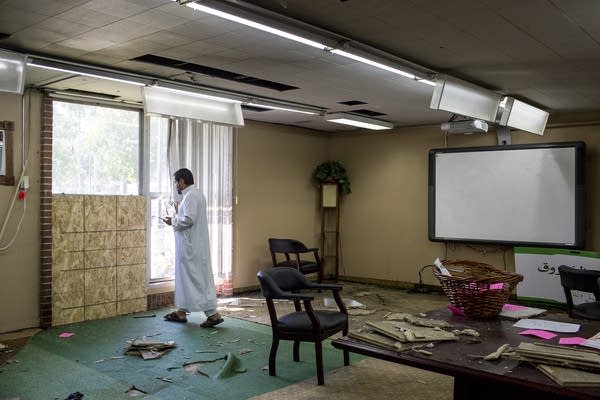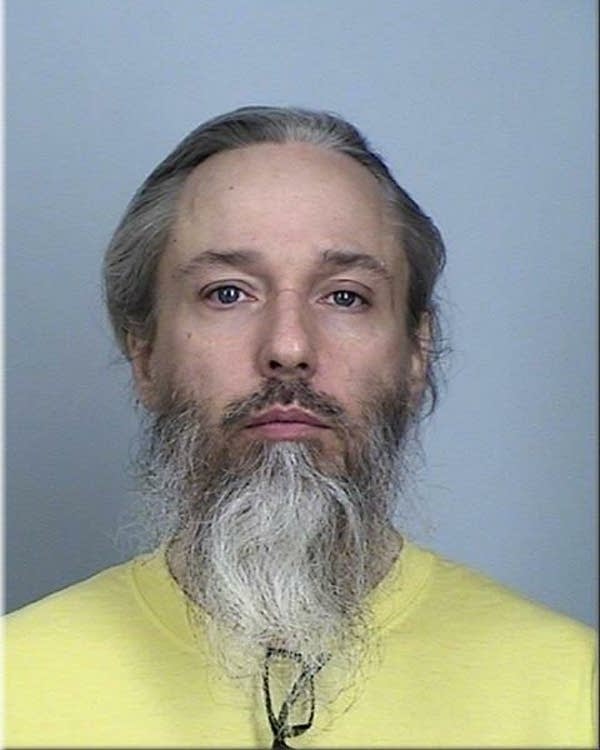Mosque attacker testifies against alleged ringleader of 2017 firebombing

Go Deeper.
Create an account or log in to save stories.
Like this?
Thanks for liking this story! We have added it to a list of your favorite stories.
One of the men who pleaded guilty to firebombing a Twin Cities suburban mosque in 2017 testified against the alleged ringleader in federal court Thursday.
In response to questions from a prosecutor, Michael McWhorter testified that he drove with Michael Hari, 49, and Joe Morris, 25, more than 500 miles from their home in Illinois to attack the Dar Al Farooq Islamic Center. The early morning attack on August 5, 2017 damaged the building, but no one was injured.
McWhorter, 31, said Hari timed the attack to precede early morning prayers at the mosque.
The two co-defendants pleaded guilty to hate crime and explosives charges early last year and agreed to testify against Hari in the hopes of avoiding a 35-year mandatory minimum sentence.
Turn Up Your Support
MPR News helps you turn down the noise and build shared understanding. Turn up your support for this public resource and keep trusted journalism accessible to all.
Prosecutors say Hari formed the anti-government “White Rabbit Militia” in the months following the bombing and carried out other attacks in Illinois, including the attempted bombing of a women’s clinic in Champaign and the bombing of train tracks in an effort to extort money from a railroad.

On the witness stand Thursday, McWhorter described how he was in financial trouble in the summer of 2017. His car broke down and he lost his job. He said he only completed school through 10th grade and was desperate for money.
It was around this time that Hari called him and asked if he was interested in a “security” job with his company and promised him $50,000. McWhorter said Hari showed him pictures of helicopters and planes, implying that the work would be adventurous.
In the days before the attack, McWhorter said he drove with Hari to a gun shop in Indiana, where Hari purchased black powder. At this point, McWhorter said he didn’t know what it was for. On August 4, McWhorter said Hari told him to pack enough clothes for a month, and that “we were going to work.”
McWhorter testified that they used paper maps and avoided toll roads while driving from their hometown of Clarence, Ill. to Bloomington, Minn. to avoid tracking and detection.
When they were about an hour away from their target, Hari informed the other two men that they were going to bomb a mosque. When they stopped for gas, McWhorter said Hari grabbed an empty washer fluid bottle from the trash and filled it with a mix of diesel fuel and gasoline.
When they entered their guilty pleas, Morris admitted that he threw the container into the building after smashing the window. McWhorter said he lit the fuse on the pipe bomb and heaved it inside. Prosecutors say the device contained about 10 pounds of black gunpowder and shook the building’s cinder block walls when it exploded.
McWhorter said Hari chose Dar Al Farooq because he thought that investigators would not suspect someone from Illinois, and Hari believed that it was a “terrorist training school.”
There is no evidence for this. Several men convicted of trying to join ISIS had met at the mosque, but investigators say the men self-radicalized online, and there was nothing to indicate that religious leaders had encouraged them.
When Assistant U.S. Attorney John Docherty asked McWhorter if he had second thoughts about carrying out the attack, McWhorter said that he did. But McWhorter added that he went forward with the plan because he feared that Hari would shoot him.
He said they chose a window where the lights were off because “we didn’t want to hurt anyone.”
Mosque Executive Director Mohamed Omar told MPR News that he was in the office next door to the blast zone, and that a brick wall between the two rooms likely saved his life.
Dear reader,
Political debates with family or friends can get heated. But what if there was a way to handle them better?
You can learn how to have civil political conversations with our new e-book!
Download our free e-book, Talking Sense: Have Hard Political Conversations, Better, and learn how to talk without the tension.



